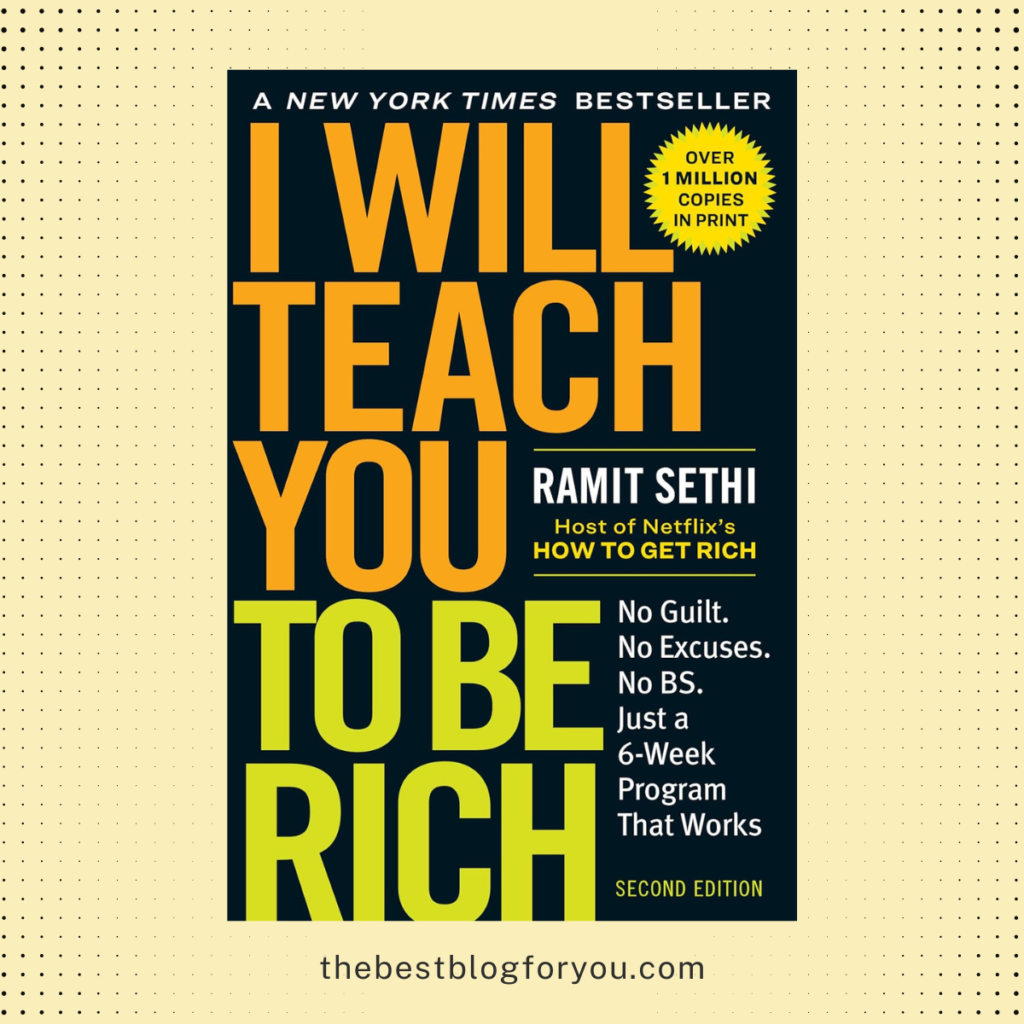
1. On Financial Freedom and Mindset:
“The goal is not to be rich; the goal is to be rich enough that you can do what you want.”
Ramit Sethi emphasizes that true financial success is not merely about accumulating wealth but about achieving a level of financial stability that allows you to pursue your passions and desires. This mindset shift encourages readers to focus on what money can enable them to do, rather than obsessing over wealth for its own sake.
“Money is a tool. It’s a tool to get the things you want in life, but it’s not the thing itself.”
In this quote, Sethi underscores the idea that money should be viewed as a means to an end, not the ultimate goal. By recognizing money as a tool, individuals can better align their financial decisions with their broader life goals, rather than letting the pursuit of money dominate their lives.
“You don’t have to be a money expert to be rich; you just have to be smart with the basics.”
This quote highlights the importance of mastering fundamental financial principles. Sethi assures readers that they don’t need to be financial wizards to achieve financial success. Understanding and applying basic financial strategies can lead to substantial progress and wealth.
2. On Budgeting and Saving:
“The best way to save money is to automate your savings and investments. Make it automatic so you don’t even have to think about it.”
Sethi advocates for setting up automatic transfers to savings and investment accounts as a way to ensure consistent saving and investing. By automating these processes, individuals can remove the temptation to spend and make saving a seamless part of their financial routine.
“Don’t focus on cutting out lattes; focus on optimizing your big wins.”
Rather than fixating on small expenses like coffee, Sethi suggests that individuals should focus on significant financial decisions that have a greater impact on their financial health. This approach encourages people to prioritize major financial moves, such as investing or reducing high-interest debt, which can lead to more substantial improvements in their financial situation.
3. On Investing:
“Investing isn’t about picking the right stock. It’s about creating a portfolio that fits your risk tolerance and goals.”
Sethi emphasizes that successful investing is less about choosing individual stocks and more about building a well-rounded portfolio that aligns with your personal risk tolerance and financial objectives. This approach helps investors make more informed decisions and manage their investments effectively.
“The most important thing is to start investing early. Time is your biggest ally.”
By starting to invest early, individuals can take advantage of compound growth, which is one of the most powerful forces in investing. Sethi stresses that time in the market is more critical than timing the market, as early investments have more time to grow and benefit from compounding returns.
4. On Debt and Credit:
“Paying off debt is about changing your mindset, not just making payments.”
Sethi highlights that overcoming debt involves more than just making regular payments; it requires a shift in mindset and behavior. By addressing the underlying attitudes and habits that contribute to debt, individuals can make more meaningful progress in becoming debt-free.
“Your credit score is a measure of how well you handle borrowing money. Improve it by using credit responsibly.”
This quote underscores the importance of managing credit responsibly to build and maintain a good credit score. Sethi explains that a good credit score reflects a history of responsible borrowing and repayment, which can benefit individuals in securing favorable loan terms and financial opportunities.
5. On Earning More Money:
“Invest in yourself. The highest returns come from skills and experiences that increase your earning potential.”
Sethi advocates for investing in personal development, such as acquiring new skills and gaining valuable experiences. These investments often yield high returns by enhancing your ability to earn more and advance in your career.
“Negotiate your salary like it’s a business deal. Your skills and experience are worth more than you think.”
Approaching salary negotiations with the mindset of a business deal can lead to better outcomes. Sethi encourages individuals to recognize the value of their skills and experience and to negotiate confidently for compensation that reflects their worth.
6. On Spending Wisely:
“Spend extravagantly on the things you love, and cut costs mercilessly on the things you don’t.”
Sethi advocates for focusing spending on areas that bring joy and satisfaction while being frugal in areas that are less important. This approach helps individuals align their spending with their values and priorities, leading to a more fulfilling and financially balanced life.
“The key to a rich life is to spend on what you value and cut out what you don’t.”
By prioritizing spending on what truly matters to you and eliminating expenses that don’t align with your values, you can create a richer and more meaningful financial life. Sethi emphasizes that spending should be intentional and aligned with personal priorities.
7. On Financial Planning and Goals:
“Create a rich life plan, not just a financial plan. Your money should help you achieve your life goals.”
Sethi encourages readers to integrate their financial planning with their broader life goals. A rich life plan considers how financial decisions can support and enhance personal aspirations, leading to a more holistic and satisfying approach to managing money.
“Set specific, actionable goals for your money. General goals don’t lead to concrete actions.”
Setting specific and actionable financial goals helps individuals create clear and practical steps to achieve their objectives. Sethi argues that vague goals are less effective in driving progress, and specific goals lead to more actionable and measurable outcomes.
8. On Behavioral Finance:
“Our behaviors with money are often driven by emotions. Becoming aware of these patterns is the first step to changing them.”
Understanding how emotions influence financial decisions can help individuals make more rational and informed choices. Sethi highlights the importance of recognizing emotional patterns to better manage financial behaviors and improve overall financial well-being.
“Financial success isn’t about the perfect strategy; it’s about sticking to a plan and adjusting as needed.”
Sethi stresses that achieving financial success is less about finding the perfect strategy and more about committing to a plan and making adjustments as circumstances change. Consistency and adaptability are key components of long-term financial success.
Check out: Key Takeaways from I Will Teach You to Be Rich by Ramit Sethi
